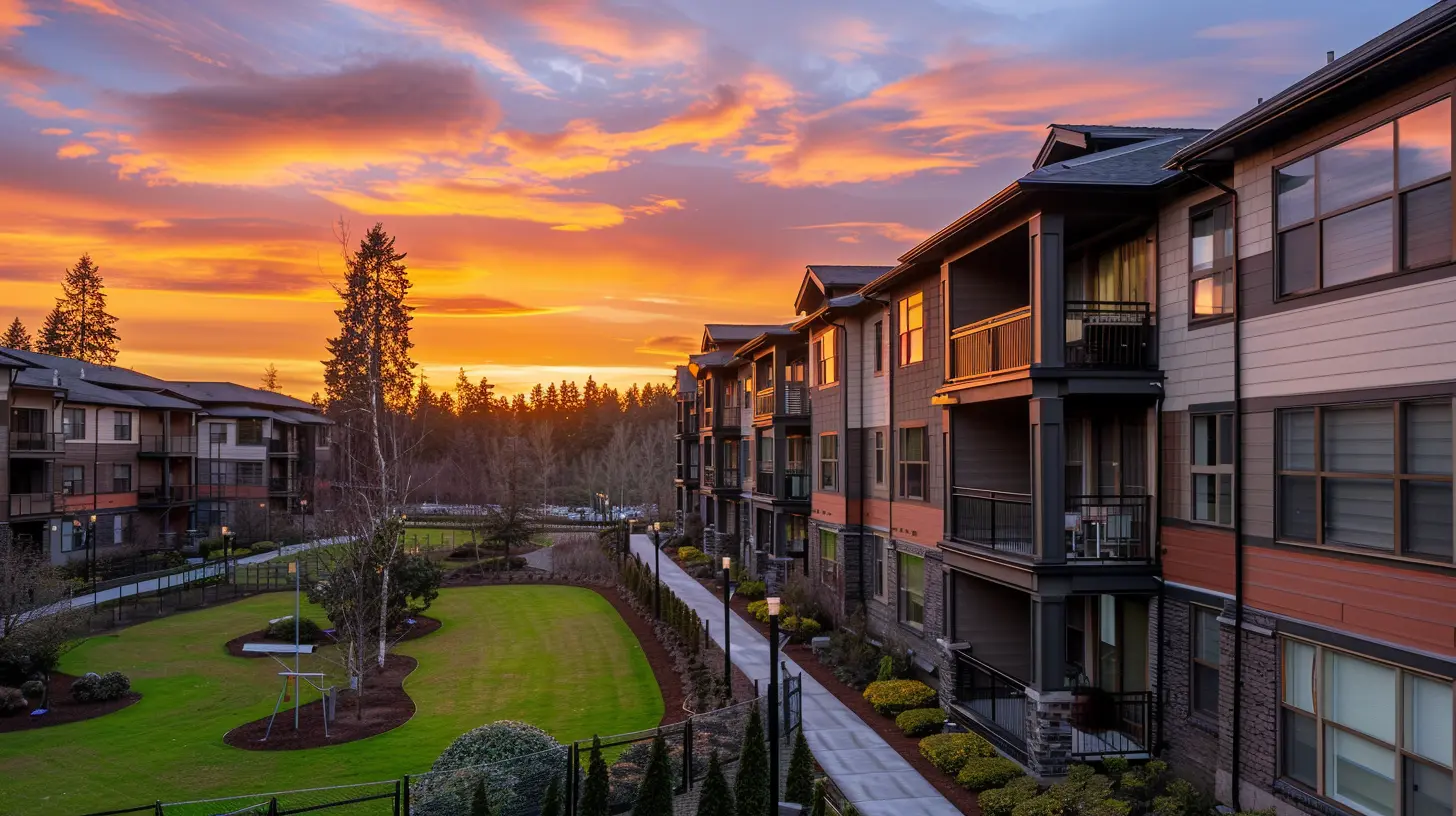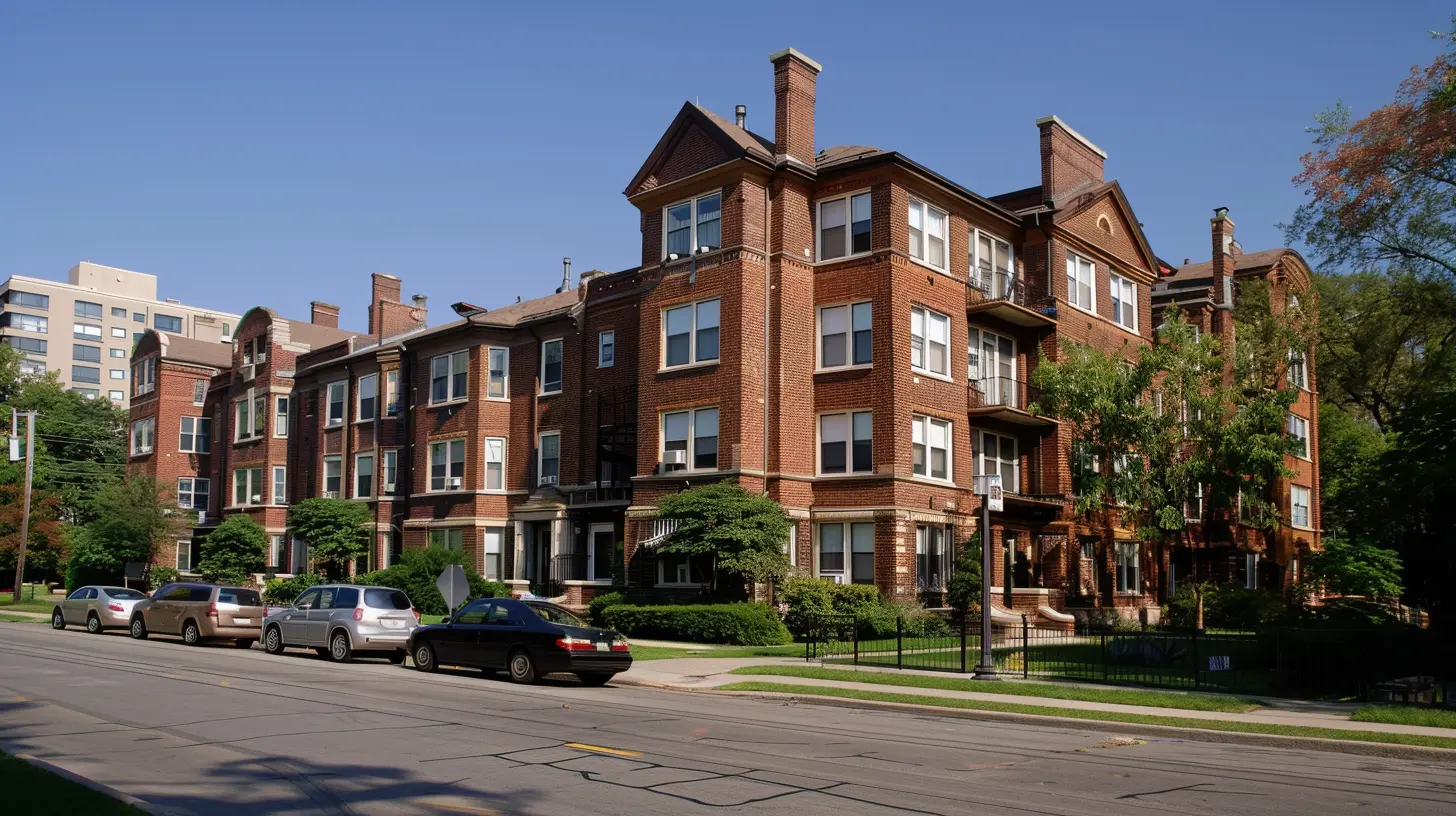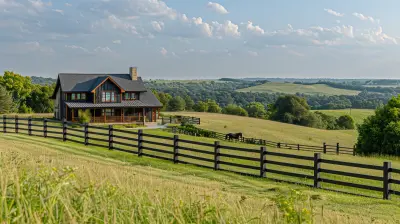Scaling Up: Moving from Small Multifamily to Larger Apartment Complexes
7 December 2024
So, you've dipped your toes into the real estate game with small multifamily properties, huh? Congrats! That’s a solid start. But now, you’re eyeing the big leagues—those sprawling apartment complexes with dozens (or even hundreds) of units. Moving from small multifamily investments to larger apartment complexes can feel like jumping from a kiddie pool to the deep end of the ocean. But you know what? It’s totally doable if you know how to navigate the waters.
In this article, we’ll break down everything you need to know about scaling up, from mindset shifts to actionable strategies. Ready to level up? Let’s dive in! 
Why Scale Up to Larger Apartment Complexes?
Let’s be honest—small multifamily properties (duplexes, triplexes, or even quads) are the ideal entry point for most real estate investors. They’re affordable, manageable, and a great way to learn the ropes. But there comes a point where staying small can actually limit your growth.Think about it: managing multiple small properties will eventually stretch your resources thin. Plus, scaling up can mean bigger profits and greater efficiencies. Larger complexes allow you to centralize operations, hire professional management, and potentially earn a more stable income with less hands-on involvement.
And let’s not forget: Bigger properties open doors to higher-quality investments, better financing opportunities, and stronger equity growth. If your goal is to build serious wealth, scaling up is the natural next step. 
Facing the Mindset Shift
First things first, let’s talk mindset. Transitioning from small multifamily properties to larger apartment complexes isn’t just a physical leap—it’s a mental one, too.When you’re managing a duplex or triplex, things are more personal. You might know your tenants by name. You might even handle repairs yourself! Moving into larger complexes means stepping into the role of a “business owner” rather than just a hands-on landlord.
Here’s the deal: You can’t do it all alone. And that’s okay. Scaling up requires you to trust professionals, delegate responsibilities, and think strategically. It’s no longer about being a jack-of-all-trades—it’s about running your real estate investments like a well-oiled machine. 
Building a Strong Foundation
Before you jump into a larger property, you need to get your ducks in a row. Here’s what that looks like:1. Assess Your Current Portfolio
Take a hard look at what you already own. Are your small multifamily properties performing well? Do you have stable cash flow? Assessing your current portfolio will give you a clear picture of where you stand financially and what you can afford to take on.2. Educate Yourself
Moving into larger properties comes with a steeper learning curve. You’ll need to understand new terms like “NOI” (Net Operating Income) and “cap rates” inside and out. Consider taking courses, reading books, or joining real estate investment groups to level up your knowledge.3. Secure Financing
Larger apartment complexes require larger chunks of capital—it’s just the nature of the beast. You’ll likely need to explore different financing options, like syndications, partnerships, or commercial loans. Pro tip: Building strong relationships with lenders and investors can make all the difference.
Finding the Right Property
Alright, now that you’re mentally and financially prepped, how do you actually find the right property?1. Set Your Criteria
Before you start searching, determine what you’re looking for. How many units? In what market? What’s your target ROI? Having clear criteria will save you time and help you focus on deals that actually fit your goals.2. Research the Market
Location is everything in real estate, and this is doubly true for large complexes. Look for markets with strong job growth, population growth, and low vacancy rates. Dive into neighborhood stats and even visit the area to get a feel for its vibe.3. Network Like Crazy
When it comes to larger properties, deals are often made off-market. This is where networking comes in. Build relationships with brokers, wholesalers, and other investors to get access to deals before they hit the public listing sites.Underwriting a Larger Complex
Here’s where the rubber meets the road. Buying a larger apartment complex requires a more thorough analysis than you might be used to. Let’s break it down:1. Analyze the Numbers
You’ll want to calculate the property’s NOI, cap rate, cash-on-cash return, and IRR (Internal Rate of Return). Sound complicated? It is at first, but once you understand the formulas, it’s all second nature.2. Perform Thorough Due Diligence
Larger properties come with more moving parts. You’ll need to inspect every unit, comb through financial records, and look for any red flags (deferred maintenance, lawsuits, zoning issues, etc.). Don’t skimp on this step; it can save you a world of headaches later.Scaling Through Partnerships
Here’s the secret sauce: You don’t have to go it alone.Partnering with other investors is one of the best ways to scale up to larger complexes. Whether it’s pooling funds, sharing responsibilities, or combining expertise, partnerships can make the leap feel a lot less daunting.
Think of it like climbing a mountain. Sure, you could do it solo, but wouldn’t it be easier (and more fun) with a team? Just make sure everyone’s on the same page about expectations, responsibilities, and profit-sharing before you dive in.
Hiring Professional Management
Managing a duplex on your own? Totally doable. Managing a 100-unit complex without help? Absolutely insane.Once you scale up, hiring a professional property management team is non-negotiable. They’ll handle tenant screenings, maintenance requests, rent collection, and more. This frees you up to focus on growing your portfolio rather than dealing with day-to-day headaches.
Yes, management fees will cut into your profits, but the time and stress they save are worth every penny.
Overcoming Challenges
Let’s be real: Scaling up isn’t all sunshine and rainbows. You’re going to face roadblocks, from financing hurdles to competition from other investors. But remember: Bigger challenges mean bigger rewards.When things get tough, lean on your mentors, network, and education. Every obstacle you overcome is just another feather in your real estate cap.
The Reward of Scaling Up
Here’s the best part: Once you make the leap, the benefits are exponential. You’ll enjoy:- Increased Cash Flow: More units = more income.
- Economies of Scale: Bulk services (like landscaping or repairs) are typically cheaper per unit.
- Professional Freedom: Less micromanaging, more strategic planning.
- Greater Equity Growth: Larger properties tend to appreciate more over time.
Scaling up might feel intimidating, but the rewards are well worth the effort.
Final Thoughts
Moving from small multifamily properties to larger apartment complexes is a game-changer. Yes, it requires a mindset shift, more capital, and a willingness to learn, but it’s also one of the best ways to grow your wealth and achieve financial freedom.So, what’s the next step? Start educating yourself, building your network, and analyzing deals. The journey might feel overwhelming at first, but remember: Every successful real estate mogul started exactly where you are right now.
Take the leap—you’ve got this!
all images in this post were generated using AI tools
Category:
Multifamily PropertiesAuthor:

Vincent Clayton
Discussion
rate this article
19 comments
Josie Green
This article offers valuable insights into the challenges and opportunities of transitioning from small multifamily units to larger apartment complexes. It’s a significant step that requires careful planning and a shift in mindset, but the potential rewards make it a journey worth considering.
March 27, 2025 at 9:14 PM

Vincent Clayton
Thank you for your thoughtful comment! I’m glad you found the insights valuable—transitioning to larger complexes can indeed be both challenging and rewarding.
Christopher McElhinney
Great insights! Scaling up can be challenging but highly rewarding.
February 21, 2025 at 12:45 PM

Vincent Clayton
Thank you! Absolutely, the journey can be tough, but the rewards make it worthwhile.
Iliana Kirkpatrick
This article insightfully highlights the strategic shift from small multifamily properties to larger apartment complexes. It effectively underscores the importance of scaling for enhanced cash flow, management efficiency, and long-term investment stability, making it a valuable read for aspiring real estate investors.
February 5, 2025 at 9:17 PM

Vincent Clayton
Thank you for your thoughtful feedback! I’m glad you found the article valuable in highlighting the benefits of scaling in real estate investment.
Lulu Ramos
Great insights! Scaling up can unlock significant investment opportunities.
February 1, 2025 at 12:03 PM

Vincent Clayton
Thank you! Scaling up indeed opens the door to greater investment potential and long-term growth.
Makayla McKinney
Exciting journey! Growth brings new opportunities ahead!
January 29, 2025 at 3:54 AM

Vincent Clayton
Thank you! Embracing growth truly opens up a world of possibilities in the multifamily space.
Faith Blair
Embracing the journey from small multifamily units to larger complexes is a testament to growth and ambition. Success in real estate is built on vision and perseverance. Keep pushing boundaries and dreaming big!
January 24, 2025 at 8:44 PM

Vincent Clayton
Thank you! Embracing this journey indeed reflects growth and determination. Let's keep striving for new heights together!
Peter McPhee
Great insights! Scaling up can be challenging but rewarding for investors.
January 20, 2025 at 9:59 PM

Vincent Clayton
Thank you! Absolutely, while scaling up presents challenges, the potential rewards make it worthwhile for investors.
Bailey Thomas
Growth is key—transitioning to larger complexes opens doors to greater opportunities and returns!
January 17, 2025 at 4:39 AM

Vincent Clayton
Absolutely! Scaling up not only enhances returns but also increases our capacity to impact communities positively. Thank you for your insight!
Holden Kearns
Great insights! Excited to explore larger opportunities!
January 13, 2025 at 11:56 AM

Vincent Clayton
Thank you! I'm glad you found it helpful and wish you the best in your journey to larger opportunities!
Jillian Lamb
Big risks, bigger rewards—scale smartly!
January 10, 2025 at 12:27 PM

Vincent Clayton
Absolutely! Strategic scaling can lead to significant opportunities, but careful planning is essential to mitigate risks.
Sylas Bryant
Hidden under the surface of numbers and profits lies an untold story. What secrets do larger complexes keep that small multifamily properties whisper about? Join the journey of scaling up, where each door opens to a world of possibilities.
January 6, 2025 at 7:37 PM

Vincent Clayton
Thank you for your insightful comment! Indeed, the transition to larger complexes unveils a wealth of opportunities and challenges that can reshape our understanding of real estate investment. Let's explore these hidden stories together!
Peyton Black
What an inspiring read! The journey from small multifamily homes to larger apartment complexes is a thrilling adventure filled with endless opportunities. Embracing growth and scaling up opens doors to new possibilities and vibrant communities. Cheers to all the budding investors ready to make their mark! 🌟🏢
December 30, 2024 at 1:07 PM

Vincent Clayton
Thank you for your kind words! I'm glad you found the journey inspiring—here's to the exciting opportunities that lie ahead for all aspiring investors! 🌟🏢
Blaze Strickland
This article offers valuable insights into the transition from small multifamily homes to larger apartment complexes. It effectively highlights the challenges and opportunities involved, making it a useful read for investors. Understanding market dynamics and financial strategies will be crucial for a successful scaling process.
December 26, 2024 at 8:54 PM

Vincent Clayton
Thank you for your insightful comment! I'm glad you found the article helpful for understanding the complexities of scaling in multifamily real estate.
Zane Rivera
Transitioning from small multifamily properties to larger apartment complexes is a strategic move that can enhance cash flow and portfolio diversity. Understanding market dynamics and management complexities is crucial for successful scaling.
December 22, 2024 at 5:58 AM

Vincent Clayton
Thank you! You're absolutely right—navigating market dynamics and management challenges is essential for successfully scaling up from small multifamily properties to larger complexes. Your insights highlight the importance of strategic planning in this transition.
Elsinore Ellison
Embrace the journey of scaling up! Transitioning from small multifamily units to larger complexes unlocks endless opportunities for growth, investment potential, and community impact. Dare to elevate your real estate game!
December 18, 2024 at 3:58 AM

Vincent Clayton
Thank you! Embracing this journey truly opens up exciting avenues for growth and community enhancement. Let's elevate our real estate game together!
Thea James
Exciting journey ahead! Embrace the growth, learn from each step, and soon you'll be mastering those larger apartment complexes!
December 15, 2024 at 12:15 PM

Vincent Clayton
Thank you! I'm excited for the journey and the growth that comes with it!
Simone McVicker
Scaling up from small multifamily properties to larger complexes can be a game changer for investors. It offers the potential for greater cash flow and economies of scale. However, it's essential to conduct thorough market research and financial analysis to mitigate risks effectively.
December 12, 2024 at 3:24 AM

Vincent Clayton
Absolutely! Scaling up can indeed unlock significant benefits, but careful research and financial planning are crucial to navigate potential challenges successfully.
Abram McElveen
Great read! Scaling up from small multifamily to larger complexes is an exciting adventure filled with growth opportunities. Embrace the challenges and celebrate the wins along the way—each step brings you closer to your real estate dreams! Keep pushing forward! 🏢✨
December 8, 2024 at 12:27 PM

Vincent Clayton
Thank you! I appreciate your encouraging words and enthusiasm for the journey ahead! 🏢✨
Olivia Montgomery
Why settle for cozy when you can command a kingdom? Upgrading from quaint multifamily to expansive complexes isn’t just a move; it’s a power play. Go big or go home!
December 7, 2024 at 6:04 AM

Vincent Clayton
Absolutely! Scaling up not only enhances your investment potential but also empowers you to make a greater impact in the housing market.
MORE POSTS

How to Choose the Perfect Location for Your Next Office Space

Reverse Mortgages: A Guide to Fees and Costs

Exploring the Benefits of Horse Properties in Rural Settings

Common Mistakes to Avoid in Real Estate Photography

What You Need to Know About Rent-to-Own Affordable Housing

Making the Right Offer in a Buyer’s Market: Expert Advice

The Role of Government Grants in Producing More Affordable Housing

Handling Negative Reviews for Your Vacation Rental Property

How to Appeal to Business Travelers with Your Vacation Rental

The Importance of Property Management in Commercial Real Estate

Financing Options for Luxury Real Estate Properties

Profitable Exit Strategies for Real Estate Investors